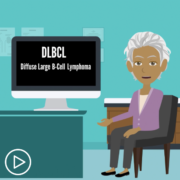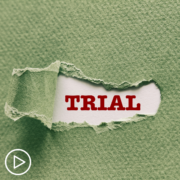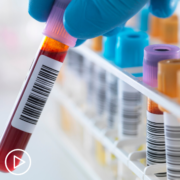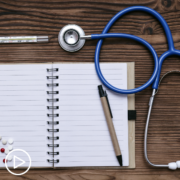How to Make an Informed DLBCL Treatment Decision
How to Make an Informed DLBCL Treatment Decision from Patient Empowerment Network on Vimeo.
What factors help guide a diffuse large b-cell lymphoma (DLBCL) treatment decision? This animated video reviews important decision-making considerations and provides important steps for engaging in your DLBCL care.
See More From The Pro-Active DLBCL Patient Toolkit
Related Programs:

|

|

|
Transcript:
Carol:
Hi, I’m Carol. Several years ago, I was diagnosed with a blood cancer known as DLBCL, which is short for diffuse large b-cell lymphoma.
This is Dr. Williams, my hematologist. A hematologist is a doctor who specializes in the care and treatment of people with blood cancer.
Dr. Williams, can you tell us more about DLBCL?
Dr. Williams:
Sure. DLBCL is the most common form of non-Hodgkin lymphoma. It may be isolated to the lymph nodes, or it may occur OUTSIDE of the lymphatic system in areas like the thyroid, skin, breast, bone, testes, gastrointestinal tract, or even other organs in the body.
Carol:
After I was diagnosed, Dr. Williams informed me that I would need to start treatment immediately.
Dr. Williams:
That’s right, Carol. DLBCL is considered aggressive and fast-growing, so treatment usually starts right away to control the disease and any symptoms it causes.
Carol:
When deciding on a therapy, my husband and I discussed the goals of treatment with Dr. Williams – we talked about the potential outcome for each approach and how options may impact my lifestyle.
Dr. Williams,
Exactly—we wanted to make sure that Carol could continue to live her life to the fullest while using the most effective approach to treat her disease.
We also considered Carol’s:
- Age and overall health.
- The location and stage of her DLBCL at the time of treatment.
- Her lab test results, including molecular testing results.
- And the potential side effects of each option.
Then we discussed Carol’s options if she didn’t respond to initial therapy or if she experienced a relapse.
Carol:
Along with Dr. Williams and the other members of my healthcare team, my husband Tony was another partner in my care. He helped me research DLBCL so I could understand more about my disease, which made me feel confident in discussions with my team.
We also made list of questions together before my appointments so I wouldn’t forget anything, and Tony took notes during my visits. His notes were helpful to us when talking about the appointment later and reviewing what our next steps may be.
Dr. Williams:
That’s great advice, Carol. It’s so important that patients feel empowered to ask questions and speak up. If you don’t feel comfortable with your providers or your treatment plan—or if you just want confirmation that you have explored all your options–consider seeking a second opinion or a consultation with a DLBCL specialist.
Elena:
Yes—and Dr. Williams always made me feel like a partner in my care– making conversations and decisions much easier for me.
Dr. Williams:
Exactly–the patient should always be at the center of care.
Now, what steps can YOU take to be more engaged?
- Start by educating yourself about DLBCL. Ask your team for recommendations for credible sources of information.
- Then, consider a second opinion or a consult with a DLBCL specialist immediately following your diagnosis.
- Make a list of questions prior to your appointments and bring a friend or family member along to visits, if you can. They can help you absorb the information and take notes.
- Understand and articulate the goals of your DLBCL treatment plan and ask if a clinical trial may be right for you.
- Learn about your options and discuss the pros and cons of each approach with your doctor.
- Finally, speak up and share your questions and concerns. YOU are your own best advocate.
Carol:
That’s great advice, Dr. Williams. To learn more about DLBCL, visit powerfulpatients.org/DLBCL.
Dr. Williams:
Thanks for joining us!










